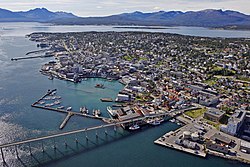Tromsø (city)
69°38′56″N 18°57′18″E / 69.6489°N 18.9551°E
Tromsø | |
|---|---|
City | |
 View of Tromsø | |
| Area | |
| • Total | 21.25 km2 (8.20 sq mi) |
| Population (2007 estimate)[2] | |
| • Total | 64,492 |
Tromsø (Norwegian pronunciation: [ˈtrʊ̂msœ] (![]() listen); Northern Sami: Romsa) is a city in Troms county, Norway. It is located on the island of Tromsøya, just off the mainland of Northern Norway. The city has an estimated population of 64,492 people[2] and an area of 21.25 square kilometres (8.20 sq mi).[1] It is the largest urban area in Northern Norway.[2][3]
listen); Northern Sami: Romsa) is a city in Troms county, Norway. It is located on the island of Tromsøya, just off the mainland of Northern Norway. The city has an estimated population of 64,492 people[2] and an area of 21.25 square kilometres (8.20 sq mi).[1] It is the largest urban area in Northern Norway.[2][3]
Economy
changeThe University of Tromsø and University Hospital of North Norway are the largest workplaces in the city. The fishing industry is also important, and Tromsø is home to the headquarters of Norges Råfisklag and Norges sjømatråd (seafood council).
Geography
changeTromsø is located in the Arctic region on the island Tromsøya.[4] It is surrounded by mountains. The highest one, called Tromsdalstinden, has an elevation of 1,238 metres (4,062 ft) above sea level.[5]
Tromsø is also surrounded by fjords. The Ullsfjorden is a notable one east from Tromsø.[6] These fjords make it possible to engage in activities such as fishing, boating, and wildlife observation.
Wildlife
changeThe waters around Tromsø are home to different types of sea animals, such as Atlantic cod, herring, seals, and whales. The yearly whale migration can be seen in Tromsø. Humpback whales, orcas, and fin whales can be seen in the fjords during the migration.[7][8][9]
Tromsø is also home to many land animals. The mountains and forests are a place to live for reindeer, Arctic foxes, and many types of birds. Seabirds like puffins, kittiwakes, and guillemots can be seen.[10][11]
Climate
changeTromsø is warmer than other places at the same latitude, thanks to the warming effect of the Gulf Stream. However, the Gulf Stream is showing signs of uncertainty because of global warming.[12][13][14] The city center of Tromsø has the highest number of old wooden houses in Northern Norway, with the oldest house dating back to 1789. The city is a cultural center for the region, with several festivals taking place in the summer.
History
changeTromsø has a long history, with evidence of people living there from at least 10,000 years ago.[15][16] The area was first settled by the indigenous Sámi, who still live there today. In the 13th century, Norwegians started to settle in the area and Tromsø grew into an important trading post. The city became a centre for fishing and whaling, which were important industries for many years.[17]
Tromsø also has a big role in polar exploration. Many expeditions to the Arctic and Antarctic regions started in Tromsø, including those of Roald Amundsen and Fridtjof Nansen. During World War II, Tromsø was occupied by the Germans, and there were many battles fought in the area.[17]
References
change- ↑ 1.0 1.1 "Population and land area in urban settlements". SSB. Retrieved 2023-04-26.
- ↑ 2.0 2.1 2.2 "Tromsø | Norway | Britannica". www.britannica.com. Retrieved 2023-04-26.
- ↑ Nikel, David (2023-04-14). "Tromsø, Norway: An Introduction to Northern Norway's Biggest City". Life in Norway. Retrieved 2023-04-26.
- ↑ Thorsnæs, Geir (2023-01-25), "Tromsøya", Store norske leksikon (in Norwegian), retrieved 2023-05-12
- ↑ Thorsnæs, Geir (2023-04-26), "Tromsdalstinden", Store norske leksikon (in Norwegian), retrieved 2023-05-12
- ↑ Thorsnæs, Geir (2023-01-25), "Ullsfjorden", Store norske leksikon (in Norwegian), retrieved 2023-05-12
- ↑ Würsig, Bernd; Thewissen, J. G. M.; Kovacs, Kit M. (27 November 2017). Encyclopedia of marine mammals (3rd ed.). London, United Kingdom: Academic Press (published 2017-12-11). pp. 34–39. ISBN 978-0128043271. OCLC 1013462545.
- ↑ "Whale watching safaris in the Tromsø region". Visit Tromso. Retrieved 2023-05-12.
- ↑ Green, Allison (2022-12-14). "Whale Watching in Tromso: 13 Things to Know & 5 Best Tours (Ranked!)". Eternal Arrival. Retrieved 2023-05-12.
- ↑ "Arctic wildlife in Norway". Visit Tromso. Retrieved 2023-05-12.
- ↑ "Polar Bears, Puffins, and More: Tips for Viewing Wildlife in Norway". kimkim. Retrieved 2023-05-12.
- ↑ Dewan, Angela (2021-08-06). "A crucial ocean circulation is showing signs of instability. Its shutdown would have serious impacts on our weather". CNN. Retrieved 2023-04-26.
- ↑ "A major Atlantic current is at a critical transition point". www.pbs.org. 17 February 2022. Retrieved 2023-04-26.
- ↑ Gonçalves Neto, Afonso; Langan, Joseph A.; Palter, Jaime B. (2021-04-20). "Changes in the Gulf Stream preceded rapid warming of the Northwest Atlantic Shelf". Communications Earth & Environment. 2 (1): 74. Bibcode:2021ComEE...2...74G. doi:10.1038/s43247-021-00143-5. ISSN 2662-4435. S2CID 233303831.
- ↑ Nikel, David (April 2019). "Tromsø and the high north". Norway (2nd ed.). Norway: Hachette Book Group. p. 326. ISBN 1640490515.
Archaeological excavations show the area around Tromsø has been inhabited since the Stone Age, with evidence of buildings up to 10,000 years old found.
- ↑ Grydeland, Sven Erik; Arntzen, Johan Eilertsen (2014). Bergli på Tromsøya: Bosetting fra eldre steinalder og tidlig metalltid [Bergli on Tromsøya: Settlement from the Stone Age and Early Metal Age] (Research report). TROMURA, Fellesserie nr. 41. Tromsø: University of Tromsø. ISBN 978-82-7142-058-1.
- ↑ 17.0 17.1 Emma (2020-04-06). "The History of Tromsø - The Hidden North". Retrieved 2023-05-01.
